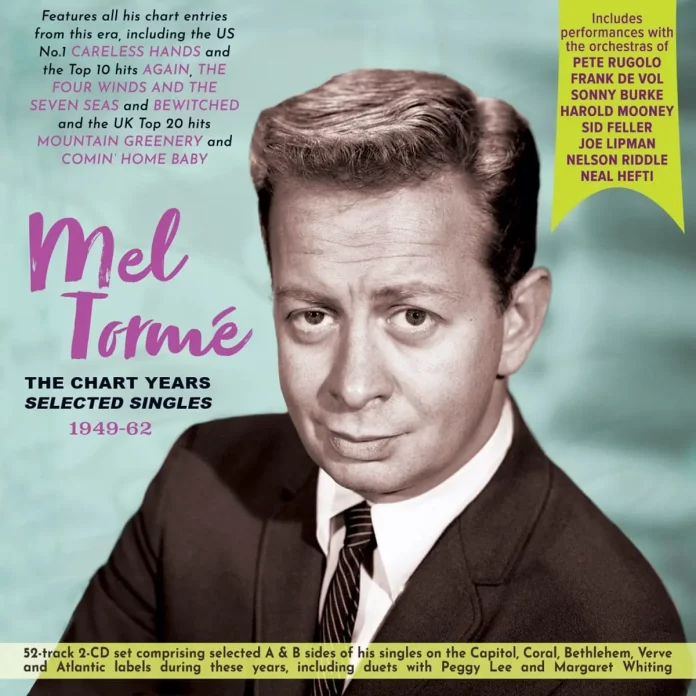New York disc-jockey Fred Robbins christened Mel Tormé “The Velvet Fog” on his radio show back in 1947. It was a term the singer was never happy with but it really summed up his perfectly in-tune, richly textured delivery.
The six albums he made with Marty Paich’s Dektette during the 50s created a body of work that represented the finest example of a singer with a jazz ensemble. Their collaboration that produced Mel Tormé Sings Fred Astaire was a salute to one of his primary influences and years later in 1982 on Mel Tormé In New York he did a medley of 20 songs introduced by Astaire in his films. His tribute concluded with Mel telling the audience at Marty’s that he was Astaire’s biggest fan.
What we have here is clearly a little different. These 52 titles are selected A and B sides of his releases on the Capitol, Coral, Bethlehem, Verve and Atlantic labels. This retrospective includes all his chart entries from 1949 to 1962 including his U.S. number 1 Careless Hands and the top-10 hits Again, Bewitched and The Four Winds And The Seven Seas. UK hits like Mountain Greenery and Comin’ Home Baby are also included.
Inevitably his attempt to reach a wider audience resulted in some material that has not stood the test of time. Meadows Of Heaven, The Old Master Painter, Bless You, I Owe A Kiss To Girl In Iowa, Black Midnight and Tutti Frutti have all lost whatever charm they might have had back in the day. There are two duets with Peggy Lee (Don’t Fan The Flame and Telling Me Yes) and two more with Margaret Whiting (Hey Look Me Over and What’s New At The Zoo).
Mel was always an inventive scat singer but the only example here is a live performance of Bernie’s Tune, which he mistakenly credits to Gerry Mulligan in his announcement. My Rosemarie is the only title featuring his vocal group The Meltones but their famous arrangement of What Is Thing Called Love would have been a far better selection.
In 1962 Nesuhi Ertegun of Atlantic Records persuaded him to record Comin’ Home Baby, which introduced him to a new, younger audience. His autobiography (It Wasn’t All Velvet) reveals that he was far from pleased to be forced to record a tune “with trite, repetitious lyrics”. That said, it reached number 13 in the UK.
Discography
CD1: Careless Hands; She’s A Home Girl; Again; Blue Moon; You’re Getting To Be A Habit With Me; There Isn’t Any Special Reason; The Four Winds And The Seven Seas; Meadows Of Heaven; There’s A Broken Heart For Every Light On Broadway; Oh You Beautiful Doll; The Old Master Painter; Bless You; I Hadn’t Anyone Till You; Cross Your Heart; The Piccolino; Bewitched; Do, Do, Do; I Owe A Kiss To A Girl In Iowa; Skylark; Lullaby Of The Leaves; The One For Me; Don’t Fan The Flame; Telling Me Yes, Telling Me No; My Buddy; You’re A Heavenly Thing (70.14)
CD2: Black Moonlight; Anywhere I Wander; Blue Skies; The Anything Can Happen Mambo; Just One More Chance; Tutti Frutti; I’se A Muggin’; All Of You; Spellbound; Rose O’Day; It Don’t Mean A Thing; Goody Goody; Jeepers Creepers; My Rosemarie; Mountain Greenery; Bernie’s Tune; Lulu’s Back In Town; Keeping Myself For You; Malaguena; Frenesi; Walk Like A Dragon; Hey, Look Me Over; What’s New At The Zoo; Her Face; Yes Indeed; Comin’ Home Baby; Right Now (72.22)
Tormé (v, p) with orchestras led by Sonny Burke, Pete Rugolo, Frank De Vol, Harold Mooney, Nelson Riddle, Sid Feller, Al Pellegrini, Neal Hefti, George Cates, Marty Paich, Billy May, Russell Garcia and Claus Ogerman. Hollywood, NYC, Los Angeles, 1949-62.
Acrobat Music ADDCD 3407
















